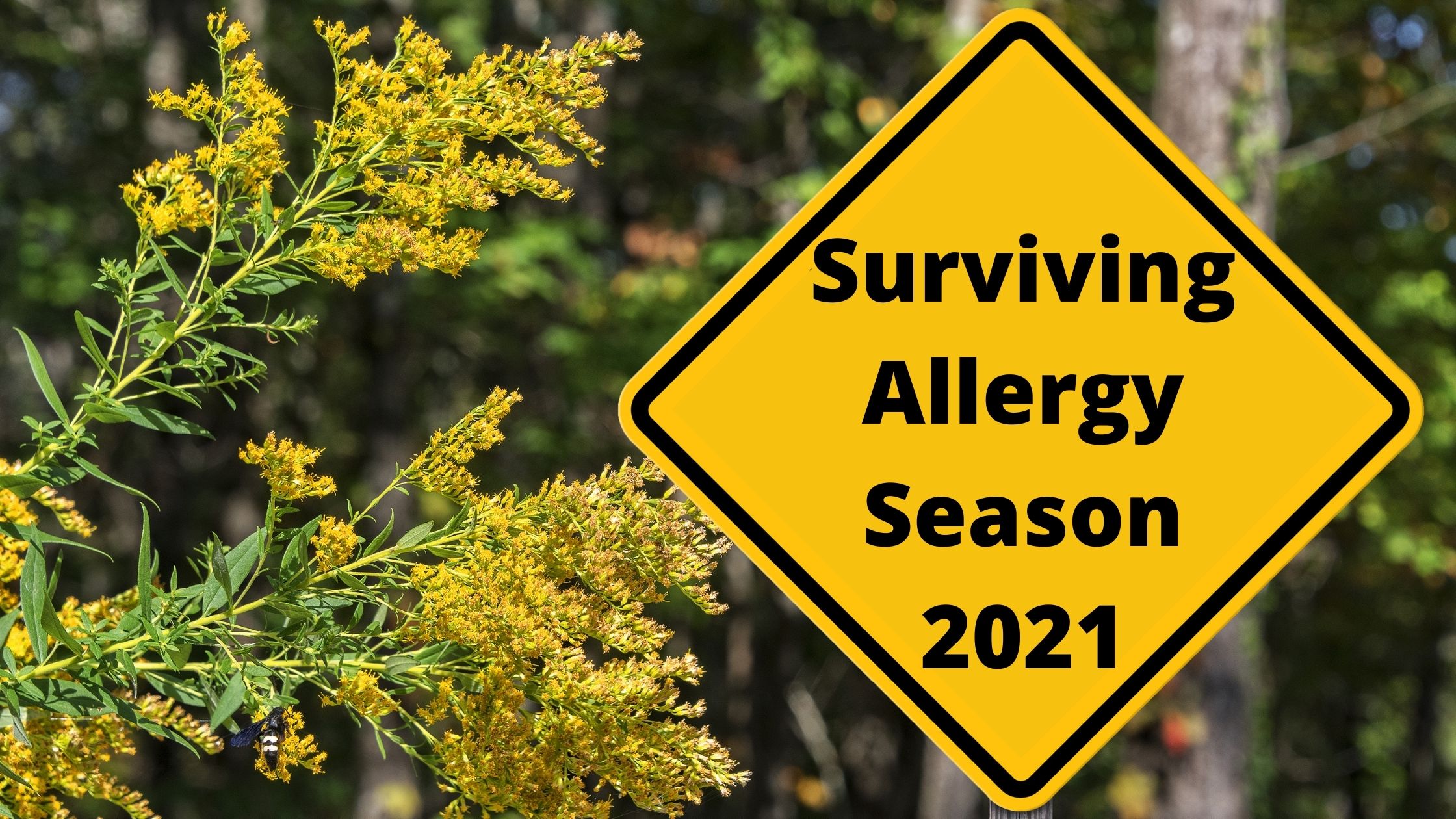
Some would say it is as certain as death and taxes... allergies. They cannot be avoided, and it's something many people dread every year. If you suffer from any respiratory illness like COPD, asthma, or cystic fibrosis, allergy season is a bearer of bad news.
If you have respiratory issues, allergy season is not something you can take lightly. Breathing in allergens can influence COPD exacerbations or if you have another form of chronic pulmonary respiratory disease allergies cause increased discomfort and worse symptoms.
COPD is one of the most common pulmonary diseases and it affects 16 million Americans. Allergies impact more than 50 million Americans every year, and many of those people also have COPD or other respiratory conditions that makes allergy season even more unbearable.
Allergy season starts in the spring and continues until the fall. Different allergens and the substances that trigger allergies, appear at different times of the year. Allergies also affect people differently, and in some cases one trigger, will not affect another.
During the spring months in March and April, tree pollen is the most common allergen, then by weeds and grasses.

From May-July all the trees, grass and weeds are creating allergens at the same time, making it a bad time for allergy sufferers. May is the beginning of peak allergy season which continues throughout July.
July to September is when ragweed starts to flower. This flowering plant is a lead cause of seasonal allergies, with 75% of all sufferers allergic to it.
October marks the end of allergy season, as the temperatures drop, and plants start to die, the air starts to rid itself of allergens, bringing an end to outdoor allergy season. While your normal respiratory symptoms will persist to some degree, at least they are not exaggerated by outdoor aliments.
![]()
Surviving allergy season
The best thing for respiratory patients to do is to minimize your exposure to allergens as best as possible. This means do not go outside when the pollen count is high or when the allergen you are allergic to is in bloom. You can utilize this Interactive Allergy Map to see what allergy conditions are in your area and get forecasts for tree, grass and ragweed pollen.
You can also try:
- To keep your pets in the house on high-pollen days so they do not drag pollen into your house.
- If you have an air filter already, be sure the screen is clean and change it often
- When you have allergy symptoms, such as itchy eyes or a runny nose, talk to your doctor about allergy medication. Taking an over-the-counter antihistamine may work for you.
- Medications such as diphenhydramine (Benadryl) and cetirizine (Zyrtec) can stop your immune response to allergy triggers and potentially lessening breathing difficulties
- You may need nasal steroids, decongestants, and inhalers to decrease your inflamed airway
- Buy a cabin air filter for your car that’s specifically designed to keep allergens out

Keep you home free of allergens by
- Install a good filtration system in your air conditioner
- Keeping your windows closed during allergy season or when the allergen forecast suggest the air is saturated with allergens
- Vacuum and dust regularly to get rid of any pollen or mold spores that may have gotten in from outside
- Get an air filter for inside your home
Talk to your doctor about your allergy symptoms and how seasonal allergies affect your COPD They may suggest a variety of options, which could include:
- trying a prescription allergy medication
- using your inhaler more often during peak allergy season
- getting an allergy test to see which allergens are causing your reactions
- trying allergy shots (immunotherapy) to reduce allergy symptoms
- Change your clothes when you go inside on high pollen days
- Keep windows and doors closed to reduce pollen entering the house
Continuing to Treat your Respiratory Illness

The most important thing you can do during allergy season is to continue to treat your condition to the best of your ability.
Treating your condition starts with you and ends with you, it is your responsibility to go to the doctors and get tested should your condition change. You should have the best oxygen equipment available to treat your condition in order to reap the many benefits of oxygen therapy. You can buy a portable oxygen concentrator with a built in filtration system that will help you breathe pure medical grade oxygen for the duration of allergy season.

You can purchase a new or used portable oxygen concentrators at LPT Medical, an oxygen equipment company based in Denver, Colorado.
Treating your COPD means continuing to exercise. You can find manageable home workouts that you are able to do indoors when high allergen counts are high.
Tacking your symptoms throughout allergy season is also important, so keep a detailed diary that explains when you took your COPD medications and your allergy medication, and note how it affects you. This will also help you keep track of whether or not your medication is giving you side effects.

Talking to your doctor is always a great place to start when it comes to your health, they will likely understand your condition the best, and be able to prescribe you allergy medication if you need it or recommend over the counter drugs that will help you manage allergies in conjunction with your disease.
Start by explaining your allergy symptoms and how seasonal allergies affect your COPD symptoms. They may suggest a variety of options, which could include:
- trying a prescription allergy medication
- using your inhaler more often during peak allergy season
- getting an allergy test to see which allergens are causing your reactions
- trying allergy shots (immunotherapy) to reduce allergy symptoms
Allergy Medication: Functions, Side Effects, and COPD
There are a lot of allergy medications, and it is important you discuss with your doctor before taking any medications because there could be side effects that negatively impact your COPD or other respiratory issues you may have.
Allergy medications can be taken as pills, liquids, inhalers, nasal sprays, eyedrops, skin creams and shots. There are over-the-counter medications and others that are prescription only, be sure you discuss with your doctor before using over-the-counter medications as well.

Here an overview of the types of allergy medications and why they're used and how they will affect you if you have COPD or another chronic respiratory illness.
Antihistamines

The purpose of antihistamines is to block histamine. Histamine is a symptom-causing chemical released by your immune system during an allergic reaction, and the goal of medication would be to suppress this reaction and make you more comfortable around allergens.
Antihistamines come in pill and liquid form and in over-the-counter and by prescription.
The function of antihistamine medications is to ease your runny nose, itchy or watery eyes, hives, swelling, and other signs or symptoms of allergies.
The side effects can make you feel drowsy and tired, and it should be taken with caution when you need to drive or do other activities that require alertness.
Antihistamines that tend to cause drowsiness include:
- Diphenhydramine
- Chlorpheniramine
These antihistamines are much less likely to cause drowsiness:
- Cetirizine (Zyrtec, Zyrtec Allergy)
- Desloratadine (Clarinex)
- Fexofenadine (Allegra, Allegra Allergy)
- Levocetirizine (Xyzal, Xyzal Allergy)
- Loratadine (Alavert, Claritin)
Antihistamine also comes in nasal spray forms to help relieve sneezing, itchy or runny nose, sinus congestion, and postnasal drip and does not normally cause drowsiness.

Side effects of antihistamine nasal sprays might include:
- a bitter taste
- In some cases drowsiness
Prescription antihistamine nasal sprays include:
- Azelastine (Astelin, Astepro)
- Olopatadine (Patanase)
- Eyedrops
Antihistamine eye drops are available over-the-counter or by prescription, and are used to treat itchy, red, swollen eyes. The drops can be made of antihistamines and other medicines.
Side effects of eye drops might include:
- headache and dry eyes.
If your antihistamine drops cause stinging or burning, you can put them in the refrigerator before you use them. The types of eye drops include:
- Ketotifen (Alaway, Zaditor)
- Olopatadine (Pataday, Patanol, Pazeo)
- Pheniramine and naphazoline (Visine, Opcon-A, others)
Antihistamines and COPD

Pretty much all nonprescription products have drawbacks, especially for those with respiratory problems such as COPD, asthma, wheezing, emphysema, or chronic bronchitis. It is prudent of the pharmacist to be aware that as a patient you have been diagnosed with a respiratory problem, and they can advise against the use of products including antihistamines, unless your physician has suggested that you do use them.
If you have COPD pharmacists can recognize your COPD through your profiles, and past prescriptions which may include inhaled bronchodilators, inhaled steroids, or other medications to treat your COPD.
All first-generation antihistamines are labeled asking patients to seek the advice their doctors before using this medication if they have COPD.
Antihistamines are not considered a treatment option for COPD but they are often used for seasonal allergies.
The benefits of taking on antihistamine could be outweighed by the negative impacts it has for patients with COPD, because drying effects of first-generation antihistamines, could dry out your mucus and inhibit the your ability to remove it.
Click here to read about coughing and clearing techniques for COPD patients
Decongestants

Decongestants are used for immediate yet temporary relief of nasal and sinus congestion that could be caused by allergies. There are side effects that can cause trouble sleeping, headache, increased blood pressure and irritability.
Decongestants come in pills and liquid form.Many decongestants, such as Sudafed, are available over-the-counter but should still be taken with caution.
Several oral allergy medications have both a decongestant and an antihistamine. Examples include:
- Cetirizine and pseudoephedrine (Zyrtec-D 12 Hour)
- Desloratadine and pseudoephedrine (Clarinex-D)
- Fexofenadine and pseudoephedrine (Allegra-D)
- Loratadine and pseudoephedrine (Claritin-D)
- Nasal sprays and drops
Nasal decongestant sprays and drops relieve nasal and sinus congestion but you can only use these for a short period of time. If you use these drugs for more than three consecutive days it could result in a cycle where your congestion gets worse. Examples of nasal decongestants include:
- Oxymetazoline (Afrin)
- Tetrahydrozoline (Tyzine)
Respiratory Disease and Decongestants

Decongestants are not recommended for people with high blood pressure, cardiovascular disease, glaucoma or hyperthyroidism. Experts will also advise against COPD patients taking antihistamines and decongestants because these medications can thicken your mucus, making it even more difficult to cough up.
Decongestants also can raise blood pressure, and some of the drugs that you may use to treat your COPD also raise your heart rate and the combination of this can be harmful.
Bottomline is these allergy medications should be used with caution. And it is a good idea to talk with your doctor about the best treatments for your allergies.
Overview
It stands to reason that if you’re experiencing a lot of coughing and sneezing due to seasonal allergies, it could be more difficult to cope with your day-to-day symptoms attributed to your COPD.
That being said, it is crucial you continue to treat your COPD, on top of taking care of seasonal allergies.
If you suffer from seasonal allergies and have COPD, it’s important to follow your doctor’s orders regarding how best handle your seasonal allergies.
There is no cure for seasonal allergies, they can be managed. Reducing your exposure to allergens is by far the healthiest and most effective way to deal with allergy symptoms.
Beyond that, you can keep your home dust and allergen free by using an air filtration system, keeping your doors and windows closed, and minimizing the time your pets stay outside.
Your doctor may also be able to recommend an allergy medication that would help you manage your seasonal allergies if it is safe for you.


.png)





